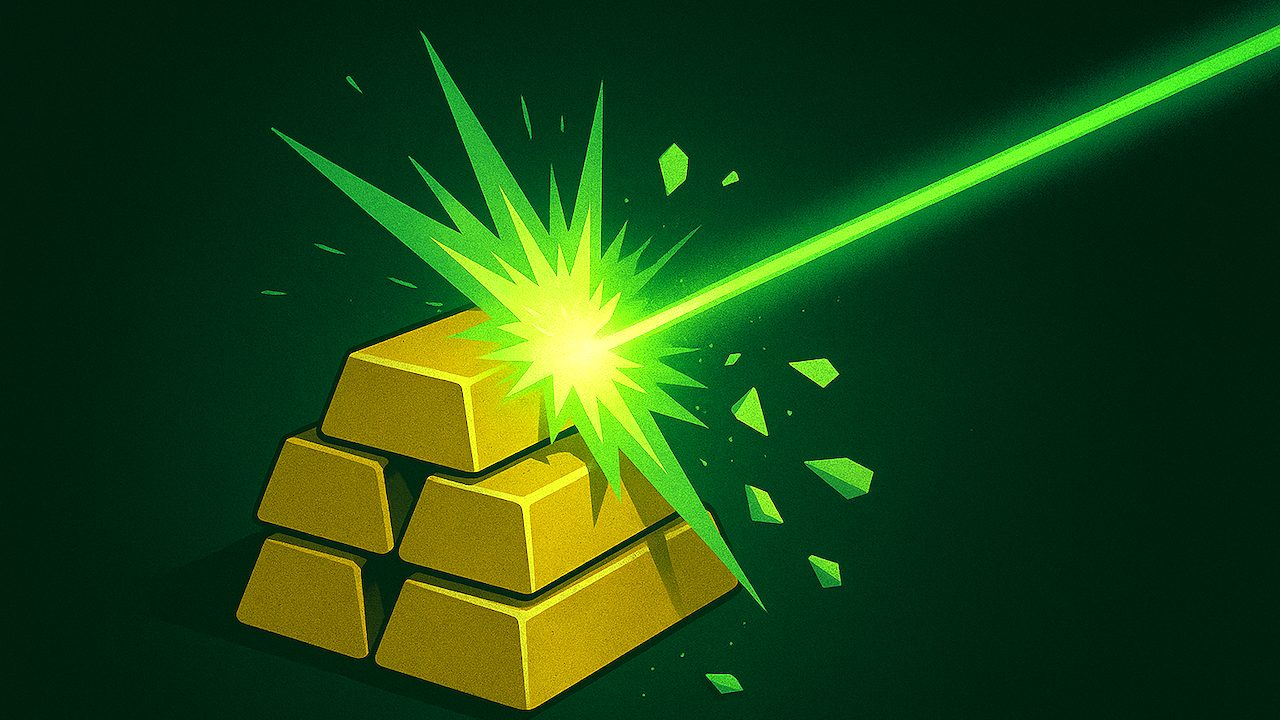(Mike Maharrey, Money Metals News Service) Do you know what you get if you blow up gold? Gold! Just in a lot smaller pieces.
One of the important characteristics of gold is that it’s virtually impossible to destroy. You can melt a gold bar, but once it cools, it’s the same bar of gold. And if you repeat the process 1,000 times, you still have that same gold bar, no worse for wear.
Now you can, in fact, blow up gold, at least theoretically. But scientists have discovered that doing so will take a lot more heat than originally thought.
In other words, gold is even more indestructible than we imagined.
When researchers recently shot a laser at gold, they initially thought they had broken physics.
You’ll be glad to know, they did not.
But they did end up revising a decades-old model in physical chemistry relating to the fundamental properties of matter. This has some interesting technological ramifications.
Scientists at the SLAC National Accelerator Laboratory used a laser to heat gold to 14 times its melting point! This was thought to have been impossible.
By the way, that’s really hot. Gold melts at 1,948 degrees Fahrenheit.
Instead of trying to summarize the sciency stuff, I’m just going to let Gizmodo describe what researchers did.
“The study is based on a two-pronged experiment. First, the scientists used a laser to superheat a sample of gold, suppressing the metal’s natural tendency to expand when heated. Next, they used ultrabright X-rays to zap the gold samples, which scattered off the surface of the gold. By calculating the distortions in the X-ray’s frequency after colliding with the gold particles, the team locked down the speed and temperature of the atoms.”
Prior to the experiment, there was a well-established theory stating structures like gold can only be heated to three times their melting point. Beyond that temperature, an “entropy catastrophe” occurs. In other words, the heated gold blows up.
According to the scientists, they were able to capture gold at a superheated temperature far above (14 times) its melting point. In this state, the metal exists in a “crystalline limbo” between a solid and liquid state. The experiment suggests that gold may not have a superheating limit. The researchers said that if they are correct, this could have a wide range of applications from space travel to nuclear chemistry to astrophysics.
“The new result disproves the conventional theory, but it does so in a big way by far overshooting the theoretical prediction, showing that it’s possible to heat gold up to a jaw-dropping 33,740 degrees F (18,726 degrees C).”
It’s important to note that this superheated state only lasted for several trillionths of a second, but scientists said it was still “long enough to be interesting.”
“If you could prevent it from expanding, [theoretically speaking] you could heat it forever.”
While gold is fundamentally money, it is increasingly being used in technological applications. Demand for gold in industry and tech was up 7 percent in 2024, driven by growth in the electronics and computing sectors.
Gold is one of the most useful metals in the world. Due to its utility, coupled with its scarcity, gold is also one of the most valuable metals in the world. The metal’s inherent physical and chemical properties make it useful in many industrial and technological applications.
This is why we see gold increasingly used in the tech sector. In fact, gold would probably be used even more if it weren’t so rare and expensive.
Gold is even helping unlock mysteries of the universe. The James Webb Space Telescope’s ability to “see” deep into the infrared spectrum allows it to image the distant universe as far back as the first galaxies and even the first stars.
Gold helps make this amazing imaging possible.
Who knows what new applications researchers may find for gold if this rewrite of the physics playbook pans out!
Mike Maharrey is a journalist and market analyst for Money Metals with over a decade of experience in precious metals. He holds a BS in accounting from the University of Kentucky and a BA in journalism from the University of South Florida.

